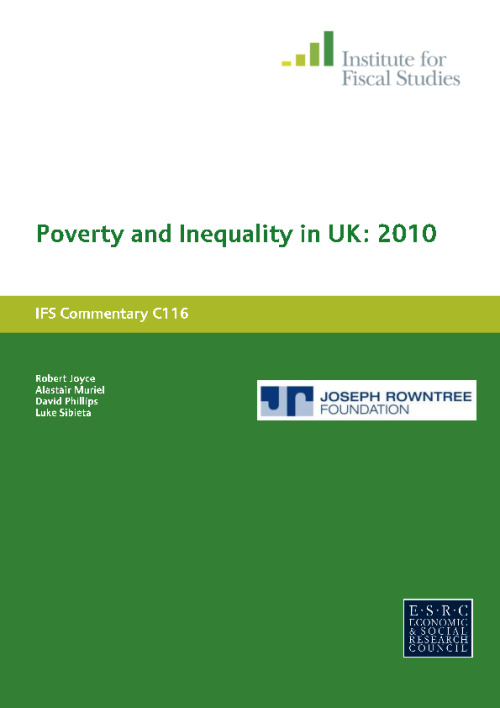Downloads

comm116.pdf
PDF | 1.17 MB
In this Commentary, we assess the changes to average incomes, inequality and poverty that have occurred since 1979, with a particular focus on the changes that have occurred in the latest year of data (2008-09) and since 1996-97. This analysis is based upon the latest figures from the DWP's Households Below Average Income (HBAI) series, published on 20 May 2010 (Department for Work and Pensions, 2010). The HBAI series takes household income as its measure of living standards, and is derived from the Family Resources Survey, a survey of around 25,000 households in the United Kingdom that asks detailed questions about income from a range of sources.
This online spreadsheet accompanies the report, showing trends in average incomes, inequality and poverty since 1961.
Click here to view our other annual reports on the topic.
Authors

Research Fellow
Luke is a Research Fellow at the IFS and his general research interests include education policy, political economy and poverty and inequality.

Alastair Muriel

Associate Director
David is Head of Devolved and Local Government Finance. He also works on tax in developing countries as part of our TaxDev centre.

Deputy Director
Robert is a Deputy Director. His work focuses on primarily on the labour market, income and wealth inequality, and the design of the welfare system.
Report details
- DOI
- 10.1920/co.ifs.2010.0116
- ISBN
- 978-1-903274-76-7
- Publisher
- IFS
Suggested citation
Joyce, R et al. (2010). Poverty and inequality in the UK: 2010. London: IFS. Available at: https://ifs.org.uk/publications/poverty-and-inequality-uk-2010 (accessed: 30 June 2024).
More from IFS
Understand this issue

Election Special: Your questions answered
27 June 2024

What is the two-child limit in benefits?
27 June 2024

Election Special: The Labour manifesto explained
14 June 2024
Policy analysis

What are the parties’ plans for benefits and taxes?
24 June 2024

How would the parties’ tax and spending plans affect Scotland and Wales?
28 June 2024

How do the last five years measure up on levelling up?
19 June 2024
Academic research

Income inequality in Ireland, 1987–2019
28 June 2024

Components of the evolution of income inequality in Sweden, 1990–2021
28 June 2024

The intergenerational elasticity of earnings: Exploring the mechanisms
3 June 2024